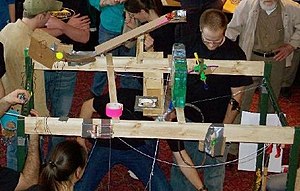I do a decent job of staying in touch with my friends and co-workers. I answer e-mail, IM or Skype, call, and even occasionally talk to them in person. I can do that without much effort because these people are well known to me. They are the ones that make the most sense to contact on a regular basis because they start conversations as well as engage in them. They are the ones that share the same space with me, whether physically or not. I don’t worry about not following up because I know that they will call me on it. They will get up in my face (physically or not) and force me to take part. That is a good thing.
I do worry about the people who are content to let opportunities pass them by. I worry about everyone who mentions me on twitter but expects little in return. I worry about the people I meet at meetings and after work events who are engaging enough to talk with, but not so much that I will remember them the next time I see them These are the folks on my periphery.
I am pretty terrible at following up, and continuing to follow up with those people. I am terrible at taking notes about who certain people are and what they may have to offer any given conversation I am having. I just default to the people directly around me whenever I have a new idea, rather than going out and really thinking through who the best people are to comment on it. This is not a good thing.
I should be able to see into my periphery as much as I can see those people at an arms length. But, I can’t.
First, I am terrible with names. Even worse, I am terrible with faces. Worst of all, I don’t have any idea what most people’s names are or what their faces really look like because Twitter and other account names obscure this information exceedingly well.
I don’t have any way to take notes on who people are, nor do I have a way of keeping track of who I should follow up on and when. There is a universe of products that aim to help with this problem. But, whether it is sophisticated CRM software or a new social startup called Gist, there really isn’t anything that allows me to truly visualize who I have talked to or who is most interesting (the Gist People page is the best version of this to date, but it still needs to be better).
Even if I can get alerts on who to contact or create a network of information around me to help access everyone I need, I still struggle with the idea that my friends are easy, my contacts are hard.
I don’t want checklists or tagged items. I don’t want tasks or customer service workflows. I simply want a way to monitor the activity that I should be monitoring. I want what a Face Book used to be, a single source for pictures and connections that are most important to the work that I am doing right now. I want different volumes of this book for every type of need I have. I want my periphery to come close and huddle around the task at hand when it is required, and then I want them to go back to being on the outside of my network because I don’t have the energy or the time to maintain friendships with all of them.
The question is, who are in these books? What do I write in the margins to give me more information about them? How can I come back to the sticky notes I leave on a regular basis?
I feel like this is the future of the contact. If anyone figures out how we can really keep all of our information about people at arms length without putting in a lot of effort, they will have solved the problem of the connected world. I could see a future version of the iPad or smart phone doing this well, but as of yet, our friends are as good as we are going to do. That is okay, but I’m not sure that will be okay forever.
Related articles by Zemanta
- Do You Have a Gist of Social Media? (shankrila.com)
- Noterr.com – Creating Sticky Notes In A Very Simple Way (killerstartups.com)
- Xobni – Social CRM For Outlook – You May Be Surprised (networksboise.wordpress.com)
- How Job Seekers Are Using Social Media for Real Results (mashable.com)
- 5 Ways to Manage Distractions for Increased Productivity (freelanceswitch.com)
- Bantam Live Launches Collaboration Workspace Service for Business Teams with Social CRM Capabilities (eon.businesswire.com)
- 10 Ways to Manage Your Social Media Staff (thoughtpick.com)
- Crm Ce Max Process Based Crm (slideshare.net)
- Social media and CRM (e1evation.com)

![Reblog this post [with Zemanta]](https://i0.wp.com/img.zemanta.com/reblog_e.png?w=1225)







